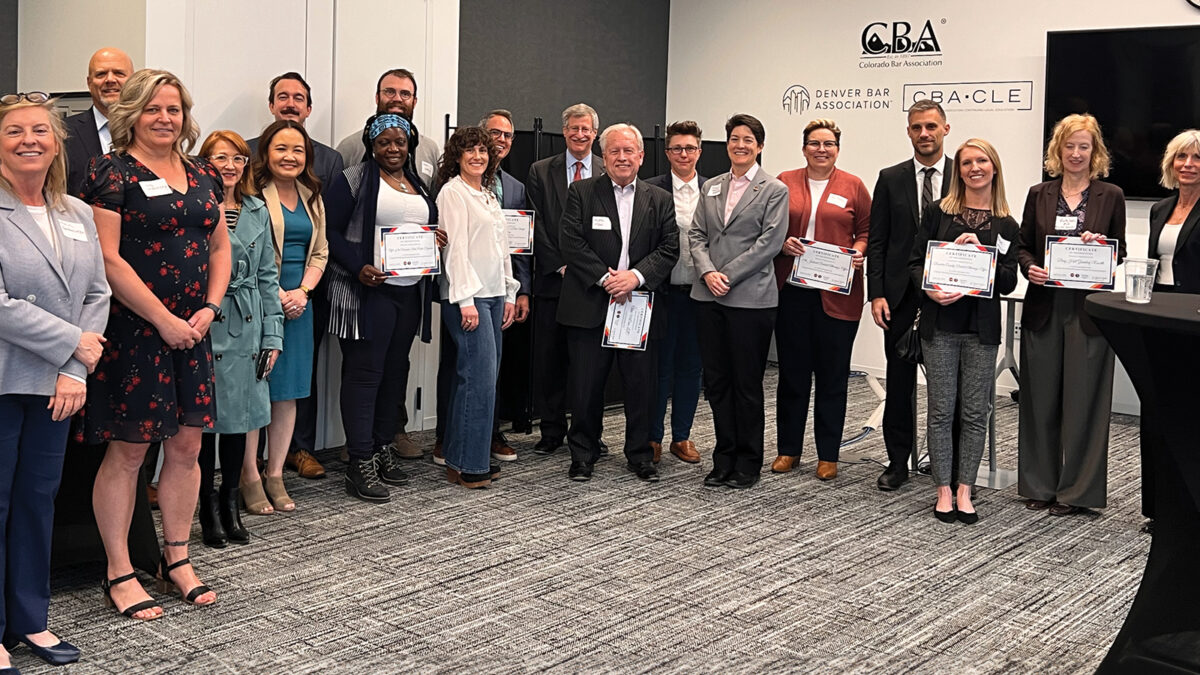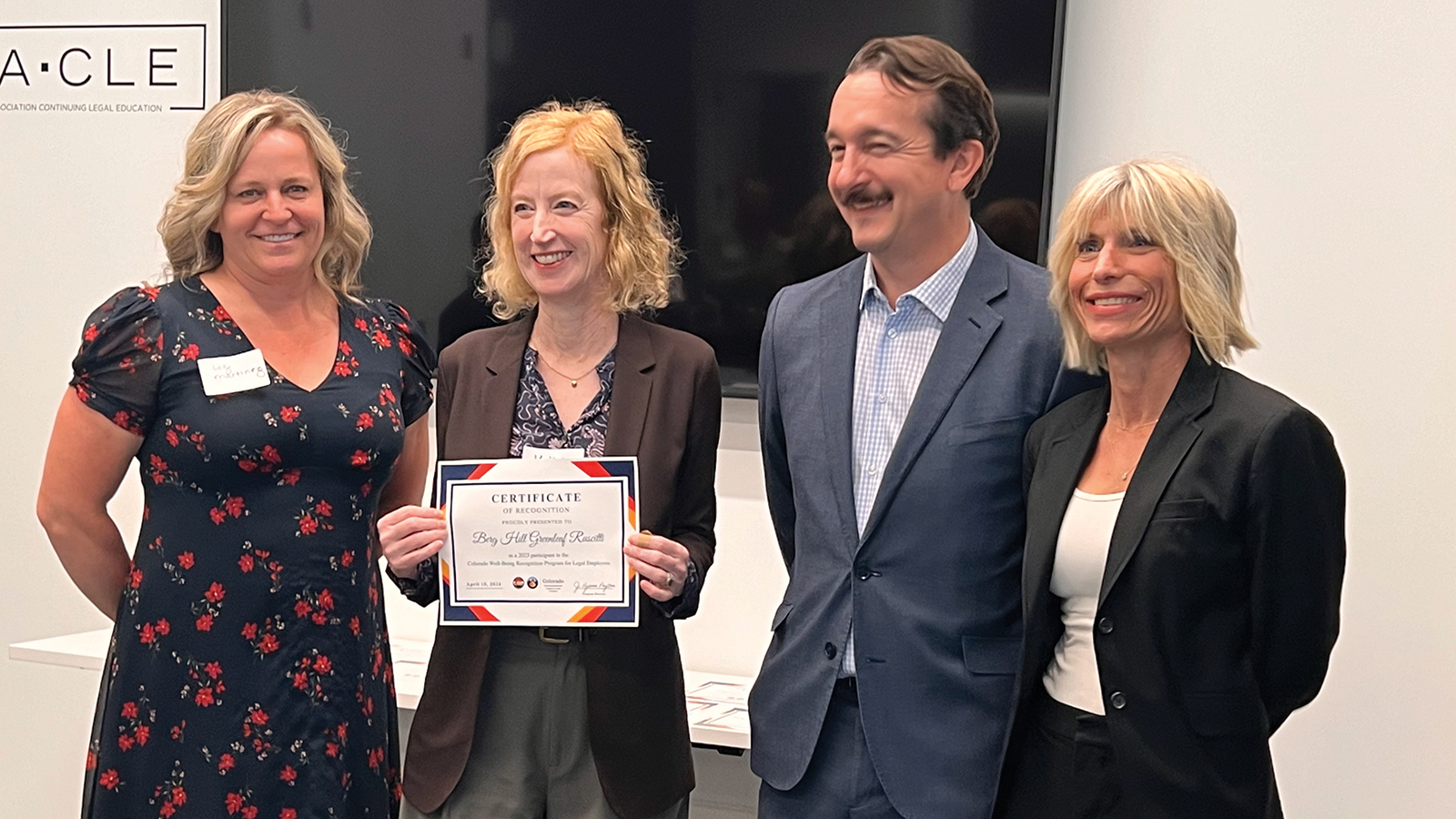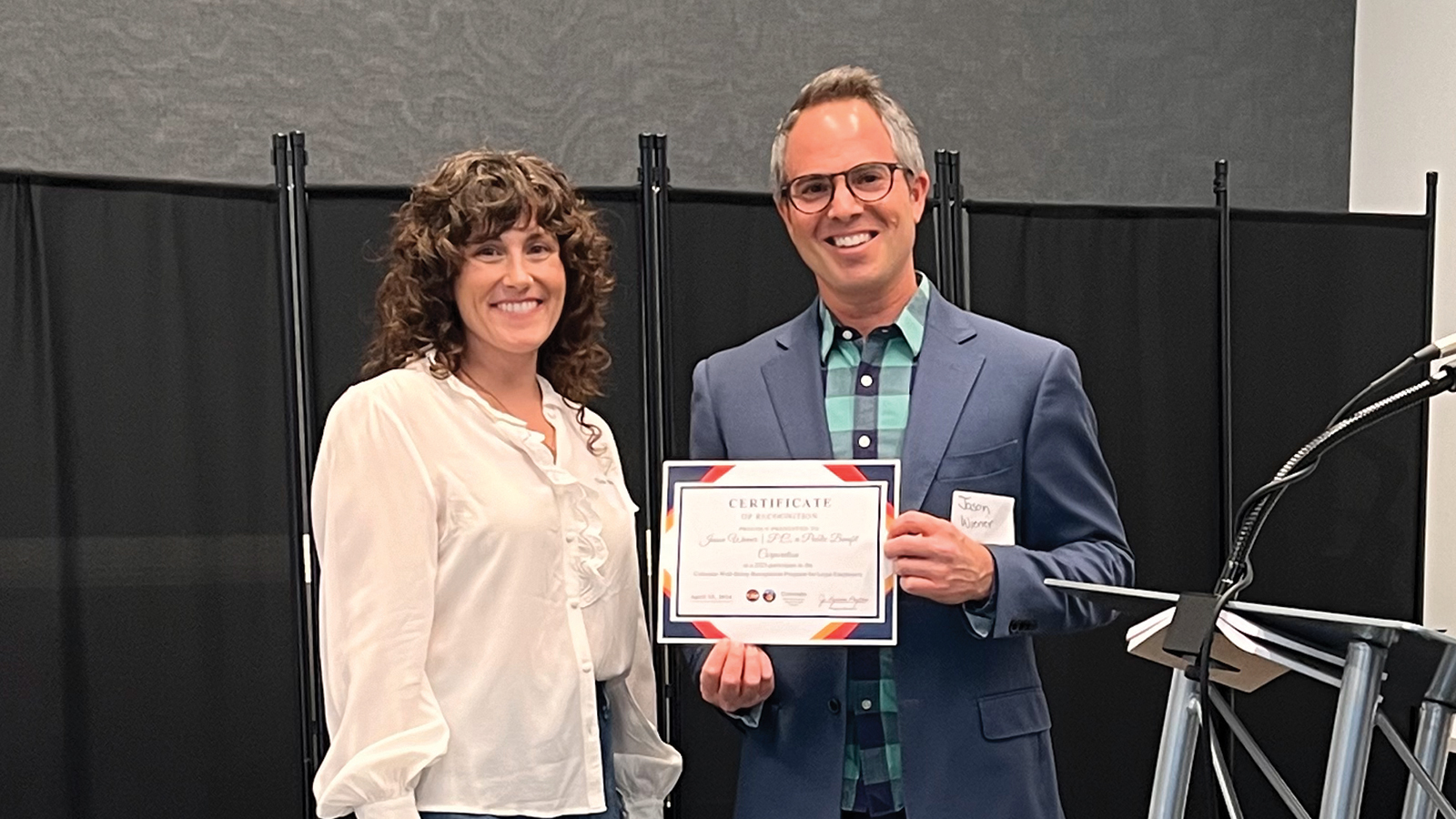
Colorado’s Well-Being Recognition Program for Legal Employers
A Year in Review
July/August 2024
Download This Article (.pdf)
As Colorado continues to lead the charge in prioritizing well-being in the legal profession, the Colorado Well-Being Recognition Program for Legal Employers stands as a beacon of progress and commitment to fostering healthy legal workplaces. Now, one year since its inception, it’s time to reflect on the impact and evolution of this innovative initiative. From promoting well-being awareness to championing systemic change in legal organizations, this program is not only reshaping the legal landscape in Colorado but also setting a precedent for legal communities nationwide. Join us as we delve into the achievements, challenges, and prospects of the Colorado Well-Being Recognition Program.
Where We’ve Been
The impetus for action in the lawyer well-being movement came from a 2016 American Bar Association and Betty Ford Foundation study that, for the first time, considered the magnitude of the problems in our profession. The study found the following:
- Between 21% and 36% of survey respondents qualify as problem drinkers, and 19% to 28% are struggling with significant levels of depression, anxiety, and stress.1
- These problems lead to high absenteeism and under-productive lawyers, resulting in high costs to law firms.2
In response to this study, the National Task Force on Attorney Well-Being called upon the legal profession to address well-being issues. Under the leadership of Justice Monica Márquez of the Colorado Supreme Court, a Colorado Task Force on Attorney Well-Being was formed in 2018 to consider ways to increase lawyers’ and legal organizations’ awareness of these issues and to inform them of the resources available.
Understanding that many of the well-being pain points in the legal profession are created and sustained by the systems and structures of legal workplaces and their cultures, the Colorado Task Force sought to create a method through which legal employers and solo practitioners could influence systemic change in their organizations, collaborate with peers to develop best practices, and be recognized for their efforts to improve the well-being of lawyers.
Over the course of five years of research and design, following the successful completion of a pilot program in 2020 during the height of the COVID-19 pandemic, the Colorado Well-Being Recognition Program for Legal Employers officially launched in January 2023. The program includes the annual Pledge to Well-Being, educational events to inform and support leaders in implementing pledged action, and recognition by the Colorado Supreme Court of the well-being commitments and achievements of Colorado’s legal employers.
The Six Goal Areas
The core function of the program is to provide Colorado’s legal employers with access to education, resources, support, and technical assistance to improve well-being outcomes in their organizations. The education and mentoring components of the program support and encourage legal employers to strive to achieve well-being objectives in six primary goal areas:
1. Creating a Culture of Well-Being Through Leadership, Accountability, and Buy-In
Well-being occurs from the top leadership through the rest of the legal organization. A committed manager or leader should be responsible for developing attorney well-being programs with appropriate buy-in from attorneys throughout the organization.
2. Fostering Competence by Developing and Supporting Programs on Substantive Development and Mentoring
Professional development is an investment that pays off for legal employers on many levels. Not only does it enhance the competence and effectiveness of lawyers and instill a sense of dedication and belonging, but the demonstrated support can also improve overall morale and well-being.
3. Developing Work-Life Integration and Flexible Work Schedules
Flexible work arrangements respect lawyers’ desire for autonomy and some measure of control over their professional and personal lives. There are multiple ways that legal employers can convey that work-life integration is expected, not just accepted.
4. Promoting Diversity, Equity, and Inclusion to Increase Organizational Success and Well-Being
Organizations should recognize that increasing cultural competence, addressing institutional and systemic barriers to success for diverse lawyers, and providing welcoming and inclusive work environments and organizational climates will lead to increased attorney wellness and retention.
5. Assessing Compensation Metrics to Promote Well-Being
Consideration should be given to alternative ways to compensate lawyers and staff for performance rather than focusing on the billable hour exclusively. Moving away from this single metric can decrease stress on employees, promote greater productivity, and bolster recruitment and retention of lawyers who have families, plan to start families, or have other caretaking responsibilities, as well as lawyers who are approaching retirement.
6. Measuring Outcomes and Making Improvements
True growth in well-being initiatives comes over time and must be assessed against organizational goals and objectives. A healthy well-being initiative will be measured in the short-term, medium-term, and long-term, and appropriate changes should be made to the initiative at each interval to promote sustainability and innovation.
Goal Areas as Building Blocks
The collective purpose of these goal areas is to encourage legal organizations to address attorney well-being proactively and to implement recommendations within their organizations to address each of the goal areas. The recommendations are designed on a spectrum to allow legal employers to select and implement recommendations on a scale from “easy and comfortable” to “challenging and disruptive to traditional legal profession paradigms.” Each year, legal employers can build on the recommendations implemented in the prior year to progressively implement more revolutionary changes within their organization structure and culture to positively influence well-being.
Year 1 in Review
The program’s strong start has been a testament to the program’s validity in Colorado’s legal community and its ability to serve the dynamic needs of legal employers and their employees. In its first year, the program engaged 48 legal employers, solo practitioners, and individual attorneys in its pledge program. The demographics of the pledge participants included:
- 22 solo practitioners or individual attorneys;
- 10 small law firms (those employing 2–5 people);
- 7 government law offices;
- 5 large law firms (those employing 16 or more people);
- 2 medium law firms (those employing 6–10 people);
- 1 nonprofit law office; and
- 1 bar association.
Geographically, the program engaged legal organizations in the Denver metro area, Boulder, Colorado Springs, Durango, Fort Collins, and Pueblo.
Our engagement goal in 2023 was to achieve at least the same participation levels as our pilot program in 2020. We were partially successful in achieving this goal. Our general participation in the program increased by 92% in year one over the pilot year. We also gained a 200% increase in the participation of solo practitioners, a 150% increase in small law firm engagement, and a 75% increase in government law office engagement. Large law firm participation stayed even. We experienced a decrease in medium and nonprofit law firm participation, and we failed to obtain any corporate legal department engagement.
The large level of participation by individual lawyers and solo practitioners (46%) led the program to pivot in April 2023 to design a separate Pledge to Lawyer Well-Being specifically designed for solo practitioners. The Well-Being Pledge for Individual Lawyers and Solo Practitioners recognizes the distinct challenges and responsibilities faced by those practicing law independently. This pledge serves as a roadmap for personal well-being improvement, providing tailored resources and strategies to navigate the complexities of solo practice. By acknowledging and addressing the specific well-being needs of solo practitioners, this pledge underscores the program’s commitment to the holistic welfare of legal professionals across diverse practice settings.
The program hosted three educational events in 2023 garnering over 1,000 attendees. Through a partnership with CBA-CLE, the program was able to offer these events at no cost or the cost of lunch. The events focused on meaningful topics to interrogate the legal profession’s cultural constructs of wellness, challenge the narratives that are keeping legal employers stuck, and share practical ways to shape legal organizations’ well-being values and goals.
In addition, the program hosted Colorado’s first Symposium on Lawyer Well-Being designed for heads of legal organizations, leaders of organizational well-being initiatives, solo practitioners, and anyone interested in driving personal and professional well-being change in Colorado’s legal communities. The all-day conference combined education, experiential learning, immersive experiences, and networking opportunities to convey meaningful methods to optimize well-being in law practice.3
Participant Feedback
In total, we estimate that this program reached approximately 2,500 legal professionals in 2023 through pledge and event participation. The feedback from participants was overwhelmingly positive, garnering an average rating of 4.8 out of 5 stars.
We asked two of our 2023 participants to share their experiences in the program and why they chose to engage their organizations and their staff in the process of doing more to impact well-being outcomes for their lawyers and staff.
Justie Nicol, who owns a small law firm in Northern Colorado called the Colorado Lawyer Team, took the pledge on behalf of her organization to “help mitigate some of the consequences of being in one of the most stressful professions.” Despite being somewhat advanced in her organization’s well-being initiatives, the program opened up a new dialogue within the firm about what her staff was experiencing at work and what they needed to be successful. Following the program’s fall symposium, the firm added a section to their employee benefit package focused on financial well-being.
Nicol shared, “Financial well-being and how to invest in your personal wealth is something that most employers aren’t going to think about. We are bringing in financial advisors and paying more attention to the invisible things that are impacting our employees’ well-being. . . . I would not have even thought of doing it had it not been for the program last year.”
When asked why solo practitioners and small firm leaders should engage with a program like this, Nicol added, “I think it starts with solo and small firm attorneys. We’re going to be the voice of change. It’s even more important that the solos and small firm attorneys are buying into this because we have a direct impact on our employees.”
Finally, Nicol commented on the peer mentoring aspect of the program: “What I was really moved by last year was not just the number of small and solo firm attorneys who participated, but how willing they were to share with each other.”
Tony Moore, who is currently a member at Warren Law Group, previously worked with Mark Fogg at Childs McCune to develop a well-being program. Moore spoke from the perspective of a medium-sized law firm leader in sharing that programs like this are “important because things like absenteeism, burnout, high attrition rates, and attorney misconduct not only impact a law firm’s bottom line, they impact us as professionals.”
When asked how the program impacted Childs McCune last year, Moore explained that it helped the firm become more organized, provided them with resources and connections, and forced them to be introspective. “The program gives opportunities to make a difference and be leaders in the profession.”
Importantly, the program helped Childs McCune establish a well-being committee and give people an opportunity to step forward to exercise leadership, plan educational opportunities, and distribute resources. One of the more creative outcomes of Childs McCune’s work in the program was to “establish a ‘technology hour’ to focus on the interplay between technology and well-being and assist employees in resolving tech issues that might be causing anxiety or frustration.”
Moore shared that people at all levels of the firm were engaged and receptive to the program components, which made it easier to devote organizational resources to implementing the program’s goals.
What’s Next?
In April 2024, the program held its first annual Recognition Ceremony to celebrate and recognize the 2023 Pledge to Lawyer Well-Being participants who submitted an attestation form certifying that they actively met the spirit of the program by adopting and prioritizing Colorado’s six-point framework for building a better future. Justice Márquez provided remarks thanking the attendees for their commitment to improving well-being in Colorado’s legal profession. Attendees were recognized for being pioneers in the movement to help lawyers take care of one another. Participants in the 2023 program received recognition in the form of a virtual “badge” to display on their organization websites and e-mail signature lines, as well as a Certificate of Recognition issued by the justices of the Colorado Supreme Court.


The program hopes to grow in 2024 in engagement and diversity of participants, specifically in the areas of corporate legal departments and medium-sized law firms. Additionally, the program would like to target more lawyers and legal organizations in Colorado’s rural and mountain areas.
The Colorado Pledge to Lawyer Well-Being has been redesigned based on participant feedback and includes more suggestions and templates for implementing the six goal areas into legal organizations.
This year also includes the launch of the Colorado Lawyer Well-Being Leadership Cohort to support organizational leaders seeking to address well-being challenges through:
- a collaborative, systemic approach to lawyer well-being that includes everyone;
- opportunities to engage with and learn from other legal organizations across Colorado;
- the development of workplace well-being leadership skills; and
- exploration of practical tools and approaches to foster a culture of well-being in legal organizations.
The leadership cohort follows six learning modules implemented through monthly meetings, tools and resources, and self-reflective exercises to improve workplace well-being leadership skills.
- Modules 1 and 2 provide the “business case” and the “why” for leading workplace well-being initiatives in legal organizations.
- Modules 3 and 4 provide an overview of how to approach systemic, structural, and cultural changes in legal organizations following the program’s six goal areas of lawyer well-being.
- Modules 5 and 6 provide a roadmap to sustainability and scalability in well-being initiatives through the leveraging of stakeholders and changemakers in legal organizations.
This program creates a meaningful space for active participation in the evolution of well-being as a core value in legal workplaces. Organizational leaders will benefit from a “cohort” structure where there is the opportunity to connect, communicate, and collaborate with other leaders in Colorado’s legal community.
The 2024 cohort launched in March 2024 with 18 members who have embarked on a six-month journey to well-being leadership.
The program events this year will consist of three “Lunch and Learn” events and the return of Colorado’s Lawyer Well-Being Symposium, an all-day conference focused on practical strategies to improve well-being outcomes in legal organizations. The remaining events for 2024 will occur on September 12 and December 10.
Join Us and Take the Pledge
We are still seeking leaders in Colorado’s lawyer well-being movement! The program is open to all Colorado legal employers, solo practitioners, and individual lawyers across the state regardless of size, structure, practice area, or clientele. The legal profession is renowned for its rigorous demands and high-stress environments, but this shouldn’t come at the cost of our mental and physical health. We must take steps to ensure our well-being remains a top priority.
That’s why we’re calling on you to take the Colorado Pledge for Lawyer Well-Being in 2024. By taking this pledge, you’re not just committing to your organization, but to the entire legal community. Let’s work together to create a culture where lawyer well-being is valued and prioritized.
Learn more about the program, register for our free events, and take the pledge at www.coloradolawyerwellbeing.org.
Related Topics
Notes
1. Krill et al., “The Prevalence of Substance Use and Other Mental Health Concerns Among American Attorneys,” 10(1) J. Addiction Med. 46 (Feb. 2016).
2. Reich, “Capitalizing on Healthy Lawyers: The Business Case for Law Firms to Promote and Prioritize Lawyer Well-Being,” 65 Vill. L. Rev. 361 (Aug. 2019), https://ssrn.com/abstract=3438029.
3. Brovsky-Eaker, “Sept. 14 Symposium Tackles Attorney Well-Being,” Law Wk. Colo. (Sept. 15, 2023), https://www.lawweekcolorado.com/article/sept-14-symposium-tackles-attorney-well-being.


